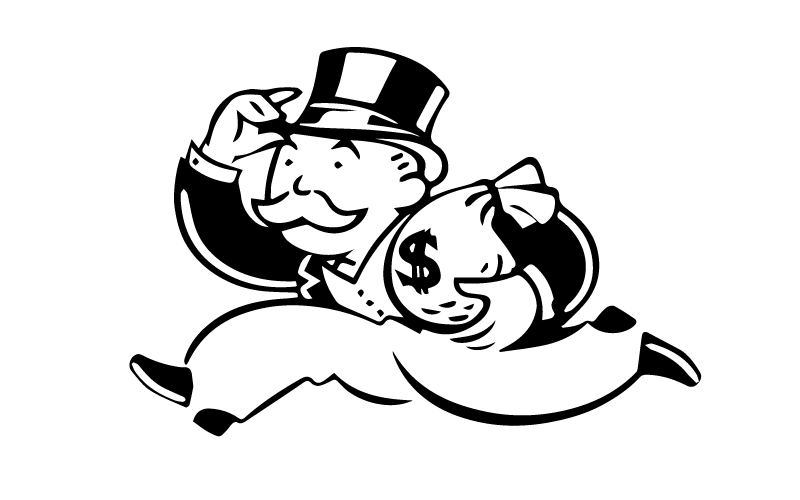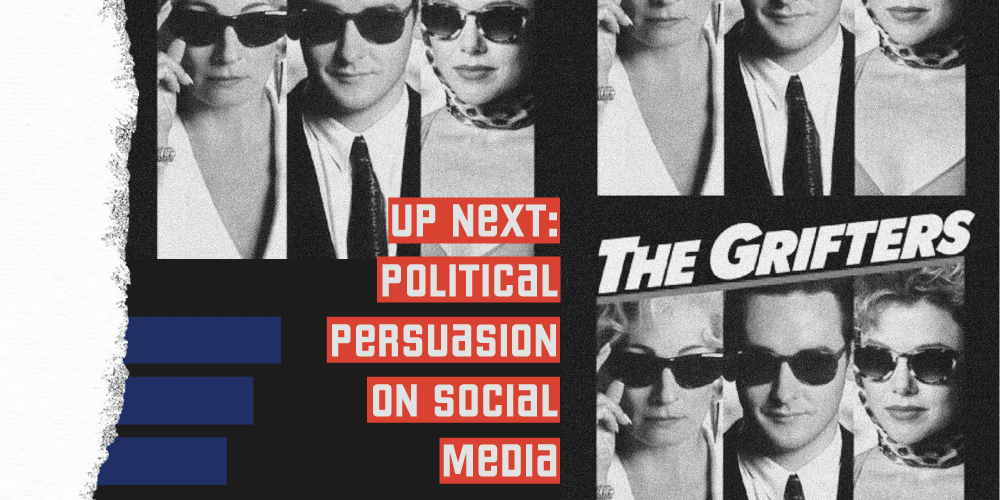This piece originally appeared on BuzzFlash.
The art of the con in the marketplace of ideas
Remember John Stossel, that slender mustachioed man whose shrill and facetious voice you were forced to endure lecturing you in your 9th-grade economics class about why sweatshop labor is a force for good? Yes, that’s the one. The guy who accosted homeless addicts in the streets and called them “freeloaders.” Stossel’s reports are hard to forget. But many people fail to remember that, until about the early ’90s, John Stossel was actually a respectable consumer reporter.
Stossel got his start as an ABC news correspondent in the early ’80s on an in-depth news segment called 20/20. He was well-known for his “Give Me Break Specials,” which exposed corporate corruption and consumer fraud. Stossel, with his sleeves rolled up and his brow ever-furrowed hit quite differently from the clean-cut polish of the Dan Rather era. He was a gritty, no-nonsense truth-teller, intent on scooping out the elbow-deep filth that lurked within corporate America. He believed “that markets [were] cruel and that we [needed] aggressive consumer regulation . . . to protect the consumer from being victimized.” At times, Stossel’s hot takes were, in fact, so spicy that ads had been pulled from the segment because of his take-no-prisoners approach.
In one report in the early ’90s, Stossel critiqued the media frenzy surrounding the alleged uptake of violent crime in America. He challenged the FBI’s method of data collection and cast aspersion on the federal government, which he believed had legislated an undue crackdown on crime. For Stossel to take this stance when America was steeped in the War on Drugs, which had bipartisan support, was relatively unheard of. During this time, Stossel collected 19 Emmys for his work, cementing him as one of the most important American investigative journalists in the field.
By the mid-to-late 90s, however, with the rise of right-wing shock jocks like Rush Limbaugh and celebrity talking heads like Bill O’Reilly, libertarian contrarianism was coming into vogue. And Stossel, a once esteemed critic of corporate debauchery, began to rebrand himself as a darling of American enterprise. “Greed is good,” he’d come to proclaim in a watershed special in ’98, “Because greed built civilization!” As Stossel’s segments transitioned from hard news-style reporting to cartoonishly shameless billionaire boot-licking, his reputation inevitably took a hit. Many of his colleagues refused to work with him because they found his reporting misleading and manipulative. On some occasions, 20/20 refused to air his segments. After a long period of creative tension, Stossel eventually moved over to Fox News in 2009, where he’s since continued to live a more sleeves-down kind of lifestyle.
Stossel’s sudden transformation could be attributed to a variety of factors. In the late ’90s, the Palmer R. Chichester Fund (now the Free To Choose Network), a libertarian media distribution non-profit, struck an affiliation with ABC to distribute Stossel in the Classroom and provide supplementary educational materials, like workbooks and study guides, to hundreds of schools throughout the country. Not long after this, Stossel was being offered sizable sums of money left and right (but really just right) to partner with and speak at think tanks like The Heritage Foundation, Koch Institute, and the Howard Rich-owned Center for Independent Thought (the present parent company of Stossel TV and Stossel in the Classroom). Together, ABC, Stossel, and these right-wing organizations slowly coalesced into a robust educational propaganda apparatus, pumping Randian economics into the minds of young American teens.

But Stossel explained his metamorphosis in less conspiratorial terms. Allegedly, he saw the light upon discovering Reason Magazine, which lent him a far more skeptical view of big government. He described his transformation as being relatively organic:
It was probably 15 years before I really woke up to the fact that almost everything government attempts to do, it makes worse […] Top-down central planning is never as effective as free individuals making their own choices, because free individuals will adapt to reality every second, but the central planners can adapt only when they get together to vote.
Privately, however, Stossel sang a different tune. “I got a little older,” he told a colleague at ABC, “and liked the idea of making real money. So I started looking at things a little differently.” In a speech he delivered to the Federalist Society in ’96, Stossel said: “I got sick of [consumer advocacy]. I also now make so much money I just lost interest in saving a buck on a can of peas.”
“Selling out” is a reductive description of Stossel’s evolution. His leanings were not just watered down by right-wing influence; they were radicalized by it. This was, after all, an Emmy-winning leftist journalist rubbing shoulders with far-right heavy-hitters in a matter of less than a decade. However, Stossel’s defection has far more historical value than meets the eye. His story was an early warning which presaged a 21st-century trend amongst the right of financial opportunism at the expense of intellectual earnestness. In other words, Stossel was and still is the first right-wing grifter.
Right-wing grifters, in contemporary terms, consist of pseudo-intellectuals, pundits, journalists, and thought leaders who ostensibly conduct a political and cultural inquiry in the spirit of intellectual honesty. But in reality, they are bad-faith actors, deigning to the lowest common denominator of irrationality and extremism, simply to line their pockets.
What we’ve seen in the last two decades, with the increasingly democratized points of entry into online political discourse, is a sudden surge of these grifters. They don’t look like your average Fox News mannequin. They have podcasts and YouTube channels. They cite studies and talk slower. But they are no more than wolves in sheep’s clothing. And they are radically changing the way young people consume politics and culture.
Dave Rubin, now a distinguished member of the Intellectual Dark Web (IDW), is one of them. If you haven’t heard of the IDW, then a SparkNotes summary might aptly describe them as a group of thinkers who routinely use pro-free speech and anti-identity politics rhetoric as a proxy for defending the hierarchies of the West. They consider “cultural Marxism” to be the scourge of academia, indoctrinating an unwitting youth into radical liberalism, or more recently, illiberalism. In addition to this, they launder Islamophobia, transphobia, and anti-feminism as good-faith intellectual inquiry.
But you wouldn’t have caught Dave Rubin in a crowd like this at the beginning of his media career. In 2013, Rubin was hosting his own segment on The Young Turks, a left-wing political commentary show on YouTube. By 2015, Rubin had moved over to Ora TV, a news network led by Larry King. Around this time, Rubin was lamenting the rising state of income inequality in the U.S. He did not believe that the gender pay gap was a myth. Rubin strongly advocated for Bernie Sanders. And if you can believe it, he devoted an entire segment of his show to the epidemic of manspreading.
In 2016, however, Rubin’s rhetoric began to skew increasingly moderate. Later that year, he partnered with Learn Liberty, an educational initiative established by The Institute for Humane Studies, a non-profit heavily subsidized by the Koch family. Although Rubin had been toying with anti-P.C. thought in his early days, his economic and fiscal persuasions took a very hard right. Rubin soon opposed raising the minimum wage; supported a flat income tax; opposed the EPA because social media is apparently the new “deputy of environmentalism”; opposed the estate tax; dismissed the gender pay gap as a myth; and has been actively trying to rebrand single-payer healthcare as a “combo of public and private.”
In response to accusations of selling out, Rubin routinely astroturfs. He has, both in interviews and tweets, repeatedly maintained that he is “not funded by the Koch brothers.” I suppose if Rubin’s definition of “funded” entails Charles Koch himself knocking on Rubin’s door and hand-delivering envelopes with wads of cash in them, then he is not being funded by the Kochs. But alas, despite two or three degrees of separation, Rubin is very much so a Koch-backed venture. His attempt to hide this demonstrates his interest in appearing as a good-faith actor whose leftist leanings died of natural causes.
Conservative activist Candace Owens makes for another compelling case. At just 31, Owens has become one of the crown jewels of the far-right. Owens is notorious for her anti-feminist views, as well as her denial of institutional racism. She opposes welfare, opposes abortion, and has accused the Black community of adopting a victim mentality with respect to concerns surrounding white supremacy.
Just five years ago, however, Owens was barking up a very different tree. In 2015, she ran Degree180, a boutique marketing agency. The company’s website hosted a blog that frequently ran stories lambasting the Republican party, Trump, and conservatism at large. A year later, after Degree180 went under, Owens launched a Kickstarter for SocialAutopsy.com, an anti-online bullying website she founded in the wake of a racist hate crime she experienced in high school. The website soon went haywire due to concerns over doxing, which subsequently embroiled her in an even bigger controversy with Gamergate, ending in the site’s ultimate demise.
So, after two failed go-arounds, the world was not smitten with Owens’ first forays into online media. A year later, Owens released a video, painfully reminiscent of a middle school iMovie skit, in which she officially declared herself a conservative. And just four months after that, Owens was hired as the Director of Urban Engagement at Turning Point USA, a right-wing youth educational non-profit heavily backed by, you guessed it, the Koch family.
Today, Candace Owens is unrecognizable from her former self, that is, aside from her penchant for sensationalistic ribble-rabble. You’ll frequently find her as a guest on Fox News, polemicizing against cultural Marxism and self-imposed black victimhood. Or you might find her on the podium of speaking engagements hosted by far-right conventions and think tanks. Like Rubin, Owens has denied what is now public knowledge about Turning Point USA’s relationship with the Koch family.
Grifters like Stossel, Owens, and Rubin have amassed significant followings with TV appearances, rallies, speaking events, and youth conferences. But the majority of their influence undoubtedly rests in their online presence. Without YouTube, a platform where thinkers, politicians, and pundits can directly engage with one another to have long-form discussions about the left and all its follies, the online right-wing intelligentsia would be too scattered to have any coherent cultural moment. Without YouTube, the Intellectual Dark Web would likely be consigned to oblivion. But instead, we have a whole cottage industry of conservative myth-makers who, by virtue of YouTube’s ever-elusive algorithm, are now infinitely connected at the click of a button.
While leftist voices continue working to establish a sizable niche on YouTube, the space is by and large dominated by the far-right. This is, in large part, due to differences in funding. Left-wing shows The Majority Report, The Young Turks, ContraPoints, and The David Pakman Show rely primarily on membership subscriptions, ad sales, and crowdfunding. (This allows fans to better hold content creators accountable for spreading misinformation.) Shows on the right, however, are far more likely to be funded by exorbitantly wealthy individuals and institutions like the Kochs. But as you can imagine, the Kochs are not particularly concerned with whether their beneficiaries are putting out content that is well-researched or well-reasoned. Rather, their main philanthropic criterion is whether someone preaches the gospel of neoliberalism. In other words, there is a reason that nobody talks about left-wing grifting; it’s because the left can’t afford to.
There are many ways in which right-wing grifters attempt to distance themselves from their con. One thing you commonly hear from left-to-right-wing apostates is that their transformation was like “waking up.” They describe it much in the same way as ex-Trotskyist Irving Kristol once put: getting “mugged by reality.” This, of course, connotes a natural quality to their conversion and handwaves the marked financial advantages held by the right. We should be extremely skeptical of those that suggest there is anything natural about changing your entire worldview within a couple of years when there is a huge financial incentive to do so.

Others on the right might concede to the fact that they are sponsored by, for example, the Koch family. But they’ll take a more audacious route by defending the Kochs themselves, claiming that their generosity is not ideologically selective in nature. After all, the Kochs have supported the ACLU; they’ve donated $100 million to renovate the New York State Theater in Lincoln Center; they’ve given grants to PBS, and they’ve funded many colleges and universities throughout the country. But this line of reasoning woefully neglects that the vast majority of the Kochs’ financial contributions have gone to right-wing initiatives, nonprofits, and political campaigns. The Koch family has been responsible for moving the Overton window on a wide range of issues, including climate change and free speech, drawing a much greater partisan divide between the left and the right.
What we’re seeing with the rise of organizations like Turning Point USA, schools like George Mason University, and coteries like the IDW is a product of the inequity faced by the left in the newest forms of online political media. The fact that one struggles to find a leftist counterpoint to something like say, Prager University, should be concerning, especially when YouTube is a dominant source of political education for teens and young adults in America.
The infiltration of online political media by right-wing grifters is not concerning because they espouse right-wing views. It’s concerning because right-wing grifters are con artists. There is, after all, a big difference between plain old right-wingers and right-wing grifters. Earnest right-wingers do not treat liberalism and conservatism as fantasy and reality. They treat the dichotomy as two separate interpretations of the same reality. But right-wing grifters are different in this regard. They believe that, in order to become a conservative, you need to get mugged by reality itself. There is, however, an inherent lie to ideology: it assumes that the vast majority of Americans haven’t already been mugged by reality from the start. •




